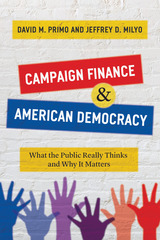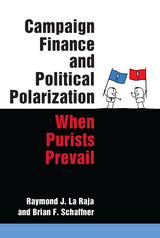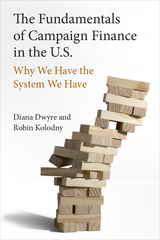3 books about Campaign Finance

Campaign Finance and American Democracy
What the Public Really Thinks and Why It Matters
David M. Primo and Jeffrey D. Milyo
University of Chicago Press, 2020
In recent decades, and particularly since the US Supreme Court’s controversial Citizens United decision, lawmakers and other elites have told Americans that stricter campaign finance laws are needed to improve faith in the elections process, increase trust in the government, and counter cynicism toward politics. But as David M. Primo and Jeffrey D. Milyo argue, politicians and the public alike should reconsider the conventional wisdom in light of surprising and comprehensive empirical evidence to the contrary.
Primo and Milyo probe original survey data to determine Americans’ sentiments on the role of money in politics, what drives these sentiments, and why they matter. What Primo and Milyo find is that while many individuals support the idea of reform, they are also skeptical that reform would successfully limit corruption, which Americans believe stains almost every fiber of the political system. Moreover, support for campaign finance restrictions is deeply divided along party lines, reflecting the polarization of our times. Ultimately, Primo and Milyo contend, American attitudes toward money in politics reflect larger fears about the health of American democracy, fears that will not be allayed by campaign finance reform.
Primo and Milyo probe original survey data to determine Americans’ sentiments on the role of money in politics, what drives these sentiments, and why they matter. What Primo and Milyo find is that while many individuals support the idea of reform, they are also skeptical that reform would successfully limit corruption, which Americans believe stains almost every fiber of the political system. Moreover, support for campaign finance restrictions is deeply divided along party lines, reflecting the polarization of our times. Ultimately, Primo and Milyo contend, American attitudes toward money in politics reflect larger fears about the health of American democracy, fears that will not be allayed by campaign finance reform.
[more]

Campaign Finance and Political Polarization
When Purists Prevail
Raymond J. La Raja and Brian F. Schaffner
University of Michigan Press, 2015
Efforts to reform the U.S. campaign finance system typically focus on the corrupting influence of large contributions. Yet, as Raymond J. La Raja and Brian F. Schaffner argue, reforms aimed at cutting the flow of money into politics have unintentionally favored candidates with extreme ideological agendas and, consequently, fostered political polarization.
Drawing on data from 50 states and the U.S. Congress over 20 years, La Raja and Schaffner reveal that current rules allow wealthy ideological groups and donors to dominate the financing of political campaigns. In order to attract funding, candidates take uncompromising positions on key issues and, if elected, take their partisan views into the legislature. As a remedy, the authors propose that additional campaign money be channeled through party organizations—rather than directly to candidates—because these organizations tend to be less ideological than the activists who now provide the lion’s share of money to political candidates. Shifting campaign finance to parties would ease polarization by reducing the influence of “purist” donors with their rigid policy stances.
La Raja and Schaffner conclude the book with policy recommendations for campaign finance in the United States. They are among the few non-libertarians who argue that less regulation, particularly for political parties, may in fact improve the democratic process.
[more]

The Fundamentals of Campaign Finance in the U.S.
Why We Have the System We Have
Diana Dwyre and Robin Kolodny
University of Michigan Press, 2024
Before the U.S. campaign finance system can be fixed, we first have to understand why it has developed into the system as it exists today. The nature of democracy itself, the American capitalist economic system, the content of the U.S. Constitution and how it is interpreted, the structure of our governmental institutions, the competition for governmental power, and the behavior of campaign finance actors have all played a role in shaping the system.
The Fundamentals of Campaign Finance in the U.S. takes care to situate the campaign finance system in the context of the broader U.S. political and economic system. Dwyre and Kolodny offer readers a brief tour through the development of the campaign finance regulatory structure, highlighting the Supreme Court’s commitment to free speech over political equality from Buckley v. Valeo (1976) through the passage of the Bipartisan Campaign Reform Act (BCRA, 2002). They also examine the driving force behind campaign finance reform—corruption—through historical, transactional, and institutional perspectives. While diving into the insufficiency of the disclosure and enforcement of campaign finance laws and calling attention to multiple federal agencies, including the Securities and Exchange Commission, the Federal Communications Commission, the Internal Revenue Service, and (principally) the Federal Election Commission, the authors show how a narrow view on campaign finance makes change difficult and why reforms often have limited success. By examining the fundamentals, Dwyre and Kolodny show the difficulties of changing a political system whose candidates have always relied on private funding of campaigns to one that guarantees free speech rights while minimizing concerns of corruption.
The Fundamentals of Campaign Finance in the U.S. takes care to situate the campaign finance system in the context of the broader U.S. political and economic system. Dwyre and Kolodny offer readers a brief tour through the development of the campaign finance regulatory structure, highlighting the Supreme Court’s commitment to free speech over political equality from Buckley v. Valeo (1976) through the passage of the Bipartisan Campaign Reform Act (BCRA, 2002). They also examine the driving force behind campaign finance reform—corruption—through historical, transactional, and institutional perspectives. While diving into the insufficiency of the disclosure and enforcement of campaign finance laws and calling attention to multiple federal agencies, including the Securities and Exchange Commission, the Federal Communications Commission, the Internal Revenue Service, and (principally) the Federal Election Commission, the authors show how a narrow view on campaign finance makes change difficult and why reforms often have limited success. By examining the fundamentals, Dwyre and Kolodny show the difficulties of changing a political system whose candidates have always relied on private funding of campaigns to one that guarantees free speech rights while minimizing concerns of corruption.
[more]
READERS
Browse our collection.
PUBLISHERS
See BiblioVault's publisher services.
STUDENT SERVICES
Files for college accessibility offices.
UChicago Accessibility Resources
home | accessibility | search | about | contact us
BiblioVault ® 2001 - 2024
The University of Chicago Press









